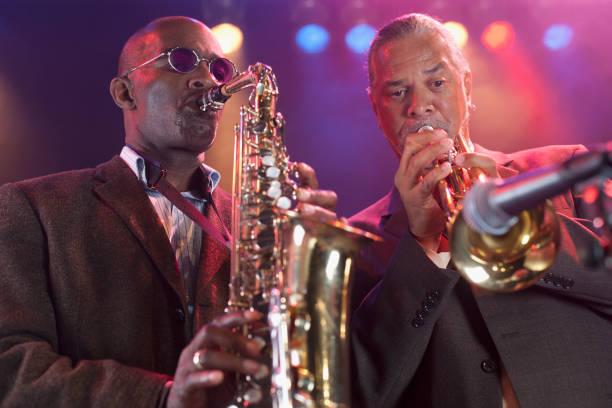(ThyBlackMan.com)
What Is Black Jazz?
Black Jazz is a distinctive and vibrant subgenre of jazz music that blends elements of traditional jazz with African American cultural expressions, creating a unique sound that speaks to the experience, struggles, and triumphs of the Black community. Rooted deeply in the African American experience, Black Jazz transcends mere music to become a powerful form of cultural and social commentary.
Purpose of the Article
This article aims to shed light on the significance of Black Jazz, exploring its origins, musical characteristics, key figures, and lasting impact. Understanding Black Jazz is crucial, as it provides insight into the cultural and historical contexts that shaped this genre and highlights its enduring influence on contemporary music and culture.

The History of Black Jazz
Roots and Origins
Black Jazz emerged from the rich tapestry of African American cultural and musical traditions, including blues, gospel, and the early forms of jazz that originated in the early 20th century. These influences converged in urban centers like New Orleans, Chicago, and New York, where African American musicians crafted a sound that was both innovative and reflective of their heritage.
Key Figures
Pioneers such as Duke Ellington, Louis Armstrong, and Billie Holiday played pivotal roles in the early development of Black Jazz. Their contributions laid the foundation for the genre, blending complex rhythms, soulful melodies, and improvisational brilliance.
Era and Context
The rise of Black Jazz was closely tied to the socio-economic conditions of African Americans in the early to mid-20th century. Segregation, racial discrimination, and the fight for civil rights deeply influenced the themes and expressions found in the music. Black Jazz became a form of resistance and resilience, giving voice to the Black experience in a segregated America.
Musical Features
Styles and Directions
Black Jazz encompasses several subgenres, each with its distinct characteristics. Bebop, with its fast tempo and intricate chord progressions; hard bop, which incorporates blues and gospel influences; and free jazz, known for its avant-garde and experimental approach, are just a few examples.
Instruments and Arrangements
Typical instruments in Black Jazz include the trumpet, saxophone, piano, double bass, and drums. These instruments are used in innovative ways, with a strong emphasis on improvisation and individual expression. Arrangements often feature complex harmonies and syncopated rhythms, creating a dynamic and engaging sound.
Performance Techniques
Vocal techniques in Black Jazz are characterized by emotive and expressive delivery, often incorporating scat singing and other forms of vocal improvisation. Instrumental techniques emphasize virtuosity and spontaneity, with musicians frequently engaging in call-and-response patterns and extended solos.
Important Artists
Iconic Figures
Artists like John Coltrane, Miles Davis, and Nina Simone are celebrated not only for their musical prowess but also for their ability to convey profound emotional and social messages through their music. These musicians pushed the boundaries of jazz, infusing it with personal and political significance.
Historical Recordings
Albums such as Coltrane’s A Love Supreme, Davis’s Kind of Blue, and Simone’s Pastel Blues are landmark recordings that showcase the depth and diversity of Black Jazz. These records remain influential, continuing to inspire new generations of musicians and listeners.
If you want to learn more about Black Jazz artists, read here.
Influence and Legacy
Cultural Impact
Black Jazz has profoundly influenced a wide range of musical genres, including funk, soul, R&B, and hip-hop. Its emphasis on improvisation and expression has also permeated other cultural forms, such as dance, visual arts, and literature.
Modern Interpretations
Contemporary musicians like Kamasi Washington and Robert Glasper continue to draw from Black Jazz traditions, blending them with modern elements to create new and innovative sounds. These artists honor the genre’s legacy while pushing it forward into new territories.
Legendary Concerts and Festivals
Events like the Newport Jazz Festival and the Montreux Jazz Festival have played significant roles in the history of Black Jazz, providing platforms for artists to perform and collaborate. These festivals celebrate the genre’s rich heritage and ongoing evolution.
Analysis of Lyrics and Themes
Main Themes and Motifs
Black Jazz often explores themes of love, struggle, hope, and resilience. The lyrics and compositions reflect the complex realities of the African American experience, addressing issues such as racial inequality, social justice, and personal empowerment.
Social and Political Context
The social and political climate of the times heavily influenced Black Jazz. Songs like Billie Holiday’s “Strange Fruit” and Nina Simone’s “Mississippi Goddam” are poignant examples of how musicians used their art to comment on and challenge the status quo.
Evolution and Contemporary State
Development of the Genre
Over the decades, Black Jazz has evolved, incorporating elements from various musical traditions and adapting to changing cultural contexts. While maintaining its core characteristics, the genre has expanded to include diverse influences and innovative approaches.
Current Artists
Today, artists such as Esperanza Spalding, Christian Scott aTunde Adjuah, and Terrace Martin continue to carry the torch of Black Jazz. They infuse the genre with fresh perspectives and contemporary sensibilities, ensuring its relevance in the modern musical landscape.
Future Prospects
The future of Black Jazz looks promising, with new talents emerging and technology providing unprecedented opportunities for creativity and collaboration. The genre’s adaptability and deep cultural roots suggest that it will continue to evolve and inspire for generations to come.
Conclusion
Black Jazz is more than a musical genre; it is a testament to the resilience, creativity, and enduring spirit of the African American community. By understanding its history, appreciating its musical features, and recognizing its impact, we can gain a deeper appreciation for this vital cultural expression and its ongoing legacy.
Staff Writer; Greg James

















Leave a Reply